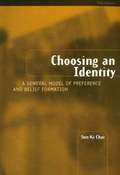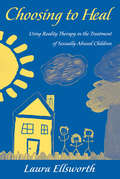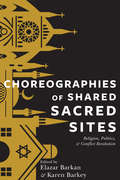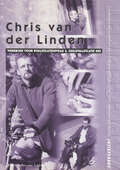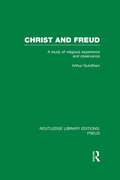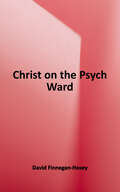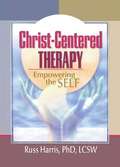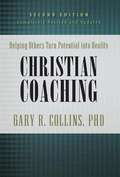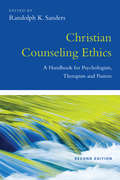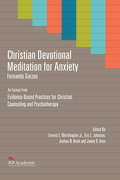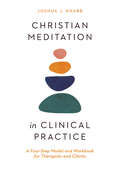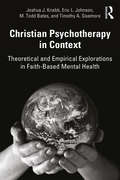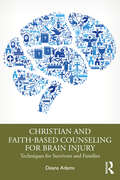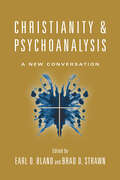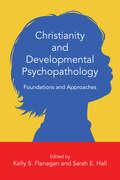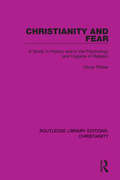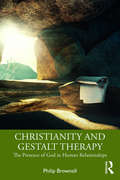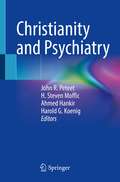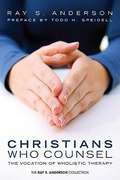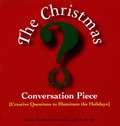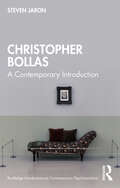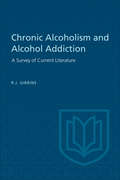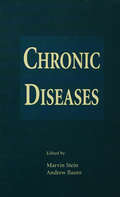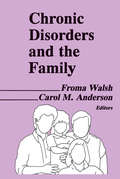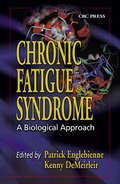- Table View
- List View
Choosing an Identity
by Sun-Ki ChaiSocial science research is fragmented by the widely differing and seemingly contradictory approaches used by the different disciplines of the social sciences to explain human action. Attempts at integrating different social science approaches to explain action have often been frustrated by the difficulty of incorporating cultural assumptions into rational choice theories without robbing them of their generality or making them too vague for predictions. Another problem has been the major disagreements among cultural theorists regarding the ways in which culture affects preferences and beliefs. This book provides a general model of preference and belief formation, addressing the largest unresolved issue in rational choice theories of action. It attempts to play a bridging role between these approaches by augmenting and modifying the main ideas of the "rational choice" model to make it more compatible with empirical findings in other fields. The resulting model is used to analyze three major unresolved issues in the developing world: the sources of a government's economic ideology, the origins of ethnic group boundaries, and the relationship between modernization and violence.
Choosing to Heal: Using Reality Therapy in the Treatment of Sexually Abused Children
by Laura EllsworthThe number of sexual abuse disclosures by children has been increasing at a steady rate. Therapists are faced with the dilemma of limited resources and training to help them best serve this vulnerable population. Choosing to Heal breaks new ground as the first resource to use Reality Therapy and Choice Therapy in focusing on the treatment of sexually abused children. Mental health professionals are provided with numerous techniques and strategies to utilize during the treatment process. Parents, caretakers, teachers and anyone helping children heal from sexual abuse can obtain an understanding of the process in simple and understandable language. Choosing to Heal is a must-have resource for anyone helping a child heal from sexual abuse.
Choreographies of Shared Sacred Sites: Religion and Conflict Resolution
by Karen Barkey Elazar BarkanElazar Barkan is professor of international and public affairs at Columbia University, director of School of International and Public Affair's Human Rights Concentration, and director of Columbia's Institute for the Study of Human Rights. He is the coauthor of No Return, No Refuge: Rites and Rights in Minority Repatriation and author of The Guilt of Nations: Restitution and Negotiating Historical Injustices. Karen Barkey is professor of sociology and history at Columbia University and director of the Institute for Religion, Culture, and Public Life. Her latest work, Empire of Difference: The Ottomans in Comparative Perspective, was awarded the Barrington Moore Award in the Comparative Historical Sociology Section of the American Sociological Association and the J. Greenstone Award in the Politics and History section of the American Political Science Association.
Chris van der Linden: Werkboek voor kwalificatieniveau 4, deelkwalificatie 405 (Zorggericht)
by D. Dekker S. Groot C. Müller A. WubbenZorgcategorie: Chronisch zieken Setting: Thuiszorg Kort inhoud: Chris van der Linden, een verpleegkundige in de wijk, beschrijft een werkdag waarin hij diverse zorgvragers bezoekt: mevrouw Schuurmans, meneer Acda en het echtpaar Jansen. Deze zorgvragers hebben allen een ander ziektebeeld, en allemaal gaan ze weer anders om met de beperkingen die de ziekte met zich meebrengt. De zelfstandige functie die Chris heeft in de thuiszorg vraagt om diverse vaardigheden. Niet alleen op de technische kant van het verplegen wordt een beroep gedaan, maar zeker ook op het inlevingsvermogen: achter iedere deur schuilt weer een ander verhaal. Naast het werken in de wijk heeft Chris regelmatig een teamvergadering. Hierin bespreken hij, zijn teamleden en de teamleider relevante ontwikkelingen die zich voordoen op micro-, meso- en macroniveau.
Christ and Freud: A Study of Religious Experience and Observance (Routledge Library Editions: Freud)
by Arthur GuirdhamOriginally published in 1959, this book is primarily concerned with the question of psychiatric factors in religion, and, conversely, with that of religious factors in psychiatry. It rejects the Freudian theory that religion is a form of obsessional neurosis. Though this latter hypothesis may explain many of the phenomena of religious observance, it cannot explain the reality of religious experience. Dr Guirdham believes that orthodox Christianity is a perversion of the psychologically irrefutable teaching of Christ and that its conception of God as a supreme being endowed with supreme power, its teaching on the resurrection, and its contamination with a sense of guilt, are especially conducive to psychiatric disorder. He shows how theology may actually be inimical to religious experience and how faith differs from belief and is a response of the whole man. The book explains also the psychological origins of clericalism and demonstrates the role played by the latter in stifling religious experience.
Christ on the Psych Ward
by David Finnegan-HoseyA series of reflections on the intersections among mental health, faith, and ministry. Beginning with his own experience, Finnegan-Hosey shares ways communities of faith can be present with those suffering from mental illness and crises. Weaving together personal testimony, theological reflection, and practical ministry experience, he offers a message of hope for those suffering and for friends and faith communities struggling to care for them. Ultimately, his journey of recovery and healing reveals the need for a theological understanding of a vulnerable God, important not solely for ministry with those with mental health struggles, but offering a hopeful vision forward for the church.
Christ-Centered Therapy: Empowering the Self
by Russ Harris Harold G KoenigHelp your clients gain access to the transformative grace of God through Christ!All too often, psychology and spirituality are kept in separate boxes, lessening the power of each to work effective changes. Christ-Centered Therapy: Empowering the Self brings together Christian faith with the Internal Family System (IFS) model. This widely accepted paradigm facilitates psychological healing by showing how the self can become the change agent for the dysfunctional internal system. Christ-centered IFS (CCIFS) combines the power of internal system therapy with the healing power of God for lasting change. Therapists with Christian clients, faith-based clients, or clients who need foundational grounding will benefit from the psychological and spiritual dimensions of Christ-Centered Therapy: Empowering the Self. This powerful therapeutic model posits a self surrounded by subpersonalities who carry anger, fear, distrust, and other negative responses. When the client&’s self takes the leadership role, the self becomes the channel for Christ&’s grace for all the subpersonalities. One by one they become empowered, center around self and God, and contribute their resources to the functioning of the whole personality.Christ-Centered Therapy: Empowering the Self provides exercises and visual aids to help both client and counselor, including: four tools to teach the self to lead effectively worksheets to serve as a structural and visual guide to understanding, developing, and using each tool a "parts map" for client and counselor to use collaboratively cartoons, structural diagrams, and dialogues to illustrate new concepts and proceduresEach chapter of Christ-Centered Therapy: Empowering the Self provides specific help for the counselor, including: case studies showing step-by-step clinical interventions a content summary a clinical outline listing the interventions in sequence an exercise to help counselors discover their own inner and spiritual dynamics Christ-Centered Therapy: Empowering the Self brings together the diagnostic and restorative power of IFS with the transforming power of Christian spirituality. It is essential for Christian counselors and for non-Christian counselors who are seeking more effective ways to treat Christian clients.
Christian Coaching: Helping Others Turn Potential into Reality
by Gary R. CollinsWith a biblically based approach, this groundbreaking textbook for life coaching presents a coaching model using how-to sections field-tested for more than eight years, custom forms coaches can use, and more.
Christian Counseling Ethics: A Handbook for Psychologists, Therapists and Pastors (CAPS)
by Randolph K. Sanders"For the clients who see us in counseling . . . theological purity will make little difference if we do not practice with ethical integrity." Randolph K. Sanders, from chapter one The work of psychotherapy and counseling is full of ethical challenges and dilemmas. Responding to these situations with wisdom is critical, not only for the professional?s credibility, but also for good therapeutic relationships and positive treatment outcomes. Since its first publication, Christian Counseling Ethics has become a standard reference work for Christian psychologists, counselors and pastors and a key text at Christian universities and seminaries. This thoroughly revised edition retains core material on counseling ethics that has made it so valuable in a variety of settings. Now fully updated, it weighs and assesses new and emerging ethical issues in the field. For example, the current volume explores ethical issues involved in: • multiple relationships • confidentiality • documentation • therapist competence and character • addressing spiritual and value issues in therapy • teletherapy • individual and couples therapy • counseling with minors • psychological first aid after disasters • counseling crossculturally In addition, the book considers dilemmas Christian therapists face in specific settings such as: • church-based counseling centers • government and military institutions • missions organizations • college counseling centers Psychologist Randolph Sanders has assembled a distinguished team of clinicians and academicians to address the issues. They include W. Brad Johnson, Alan Tjeltveit, Everett Worthington, Sally Schwer Canning, Siang-Yang Tan, Tamara Anderson, Stanton Jones, Jennifer Ripley, Angela Sabates, Mark Yarhouse, Richard Butman and Cynthia Eriksson.
Christian Devotional Meditation for Anxiety: Chapter 4, Evidence-Based Practices for Christian Counseling and Psychotherapy (Christian Association for Psychological Studies Books)
by Fernando GarzonEvidence-Based Practices for Christian Counseling and Psychotherapy,
Christian Meditation in Clinical Practice: A Four-Step Model and Workbook for Therapists and Clients (Christian Association for Psychological Studies Books)
by Joshua J. Knabban introduction to the rich resources on meditation from eight major streams of the Christian traditionpractices from the early desert Christians, Ignatius of Loyola, Celtic Christians, the Puritans, contemporary writers, and many othersguidance for targeting transdiagnostic processes—patterns of cognition, affect, behavior, the self, and relationships that may lead to psychological sufferingresearch-based evidence for the benefits of Christian meditationclient-friendly tools for practicing meditation, including step-by-step instructions, worksheets, journaling prompts, and links to tailored audio resources
Christian Psychotherapy in Context: Theoretical and Empirical Explorations in Faith-Based Mental Health
by Eric L. Johnson Timothy A. Sisemore Joshua J. Knabb M. Todd BatesChristian Psychotherapy in Context combines theology with the latest research in clinical psychology to equip mental health practitioners to meet the unique psychological and spiritual needs of Christian clients. Encouraging therapists to operate from within a Christian framework, the authors explore the intersection between a Christian worldview and clients’ emotional struggles, drawing from sources including both foundational theological texts and the “common factors” psychotherapy literature. Written collaboratively by two clinical psychologists, an academic psychologist, and a theologian, this book paves the way for psychotherapeutic practice that builds on Christian principles as the foundation, rather than merely adding them to treatment as an afterthought.
Christian and Faith-based Counseling for Brain Injury: Techniques for Survivors and Families
by Deana AdamsChristian and Faith-based Counseling for Brain Injury is the first book of its kind to offer faith-based therapy to address the emotional, cognitive, and mental health needs of individuals who have suffered a traumatic brain injury (TBI). A highly researched piece of work, the book puts forth an innovative and effective method for not only addressing the challenges of a life-changing injury but also for creating a sense of purpose. Through the nuances of faith-based counselling, this book focuses on the spiritual and existential aspects of understanding the diagnosis and creating a purpose post-injury. It examines how brain injury can affect an individual by exploring the deficits of brain injury, the impact of brain injury, and the challenges specific to damage to certain brain lobes. It also describes the mental health issues, such as depression, anxiety, grief, anger, and posttraumatic stress, that can affect both the survivor and their family members. Offering targeted counseling techniques and adaptive strategies, it shows how faith-based counselors can effectively treat brain injury. This book is valuable reading for all individuals invested in providing support to the TBI community. It is aimed at counselors, lay counselors, healthcare professionals, social workers, psychotherapists, seminary students, and upper-level graduate students. It will further be of use to for clinicians working in the outpatient level of care and private practice settings.
Christianity & Psychoanalysis: A New Conversation (Christian Association for Psychological Studies Books)
by Brad D. Strawn Earl D. BlandChristianity and Psychoanalysis
Christianity and Developmental Psychopathology: Foundations and Approaches
by Kelly S. Flanagan Sarah E. HallChristianity and Developmental Psychopathology
Christianity and Fear: A Study in History and in the Psychology and Hygiene of Religion
by Oscar PfisterOriginally published in 1948, Christianity and Fear explores the nature and history of Christian love in relation to the problem of fear. Based on methods of depth psychology and mental hygiene, the book argues for the necessity of a general concentration of the Christian religion and way of life upon the unity of love through faith and faith through love. It presents the struggle between the teaching of Christian love and the many instances of disputes on dogma that have prompted hatred and fear throughout ecclesiastical history. By using the theory of fear and compulsions, it attempts to explain the directions assumed by these aberrations in Christian history and to highlight love as the essence of the teaching of Jesus. Christianity and Fear will appeal to those with an interest in the history of Christianity, theology, and the psychology of religion.
Christianity and Gestalt Therapy: The Presence of God in Human Relationships
by Philip BrownellChristianity and Gestalt Therapy is a unique integration written for psychotherapists who want to better understand their Christian clients and Christian counselors who want a clinically sound approach that embraces Christian spirituality. This book explores critical concepts in phenomenology and how they relate to both gestalt therapy and Christianity. Using mixed literary forms that include poetry and story, this book provides a window into gestalt therapy for Christian counselors interested in learning how the gestalt therapeutic model can be incorporated into their beliefs and practices. It explores the tension in psychology and psychotherapy between a rigid naturalism and an enchanted take on life. A rich mix of theory, philosophy, theology, and practice, Christianity and Gestalt Therapy is an important resource for therapists working with Christian patients.
Christianity and Psychiatry
by Harold G. Koenig H. Steven Moffic John R. Peteet Ahmed HankirThis book aims to help readers appreciate the many-faceted relationship between Christianity, one of the world’s major faith traditions, and the practice of psychiatry. Chapter authors in this book first consider challenges posed by historical antagonisms, church-based mental health stigma, and controversy over phenomena such as hearing voices. Next, others explore both how Christians often experience conditions such as mood and psychotic disorders, disorders in children and adolescents, moral injury and PTSD, and ways that their faith can serve as a resource in their healing. Twelve Step spirituality, originally informed by Christianity, is the subject of a chapter, as are issues raised for Christians by disability, death and dying. A set of chapters then focuses on the state of integration of Christian beliefs and practices into psychotherapy, treatment delivery, educational programming, clergy/clinician collaboration, and treatment by a non-Christian psychiatrist. Finally, there are chapters by a mental health professional who has been a patient, a Jewish psychiatrist, a Muslim psychiatrist knowledgeable about Christianity and psychiatry in the Muslim majority world, and a Christian psychiatrist. These chapters provide context, diversity and personal perspectives. Christianity and Psychiatry is a valuable resource for mental health professionals seeking to understand and address the particular challenges that arise when caring for Christian patients.
Christians Who Counsel: The Vocation Of Wholistic Therapy
by Ray S. Anderson Todd H. SpeidellHow does one view Christian counseling as a calling? What is the role and task of the counselor from a theological perspective? How does one strip away the ambiguity that is too often inherent in the words therapy and counseling in a religious setting? Ray S. Anderson has written this book as a theologian with a keen interest in helping Christian counselors fulfill their task more effectively by enabling them to see that task more clearly. Too often, even counselors who achieve effective results are beset by what Anderson calls an uneasy conscience--the realization that for some reason a little transactional analysis once a week works better than a month of Sundays in curing the souls of troubled parishioners. This book seeks to put that uneasiness and ambiguity to rest by helping counselors see their work as a means of grace, rooted in a model of personhood that is both theologically and psychologically sound for realizing the full potential of each person. Christians Who Counsel has three parts, involving building a foundation for Christian counseling, exploring the spiritual dynamics in counseling, and describing counseling in a distinctly Christian mode. Written without either theological or psychological jargon, this book is for all Christians who counsel, whether pastors, lay counselors, psychotherapists, or family therapists. With clarity of vision comes the power of a renewed commitment.
Christmas Conversation Piece
by Bret Nicholaus Paul LowrieWhat one Christmas tradition would you never want to give up? If you could spend Christmas anywhere in the world, where would you most want to be? If you could have visited the Christ child just as the Three Kings did, what would you have brought as a gift? You've been chosen to host a sensational Christmas celebration on TV: What three guests would you choose to make it the best Christmas special ever? The Christmas Conversation Pieceoffers these and many other questions to pose and ponder during a season of both deep reflection and unabashed merriment. This charming volume--the perfect stocking stuffer--will provide you, your family, and your friends with twelve days of surprising and amusing Yuletide questions. Who would you most like to meet under the mistletoe? Your answer just may change by Christmas Eve!
Christopher Bollas: A Contemporary Introduction (Routledge Introductions to Contemporary Psychoanalysis)
by Steven JaronThis book provides a clear and accessible overview of the seminal clinical thinking of Christopher Bollas. Placing Bollas’s writings besides those of analysts including Milner, Bion, Winnicott, Lacan, and Green, Steven Jaron examines the central concept of the unthought known in terms of unconscious communication in the primary environment while occasioning a reworking of Oedipal configurations. Through vivid narratives of character analyzing a range of adult patients, at times requiring a rethinking of the conventional psychoanalytic frame, Jaron offers a fresh perspective on Bollas in arguing for the importance of considering not only the patient’s self experience but also the psychoanalyst's. This important study will be rewarding to beginning and seasoned analysts alike, offering suggestions for using Bollas’ work in the consulting room as well as when faced with the demands of civic life today.
Chronic Alcoholism and Alcohol Addiction
by R. J. Gibbins B. W. Henheffer A. RaisonThis book is a survey of current literature on chronic alcoholism and alcohol addiction. The authors are interested, however, not only in those individuals who are unable to give up alcohol (i.e. the addicts), but also in the more numerous abnormal drinkers all of whom are potential secondary addicts, who have developed a physiological and ultimately also a psychological need in the proceed of habituation, but in whose management of life alcohol has not played an essentially dominant role.
Chronic Diseases: Perspectives in Behavioral Medicine (Perspectives on Behavioral Medicine Series)
by Andrew Baum Marvin SteinAlthough considerable progress has been made in the understanding and treatment of a range of medical disorders, it had recently been pointed out that 85 percent of the population will be stricken by chronic disorders which may be accompanied by many years of suffering. This volume deals with issues of both cure and risk in chronic illnesses which are among the group of disorders associated with the leading causes of death in the United States at this time -- Alzheimer's disease, AIDS, and cancer. A consideration of the role of brain and behavior in relation to the cure and prevention of these disorders is the central focus of the various chapters in this book. Several chapters discuss the neuropsychological aspects of chronic illnesses including the underlying pathophysiology of changes in the brain which may be associated with both behavioral and physical signs and symptoms in these disorders. Considerable evidence suggests that a range of psychosocial or behavioral factors, such as stressful life events and depression, are associated with increased morbidity or mortality. Complex neurobiological pathways involving the brain, neurotransmitter, and neuroendocrine systems have been implicated. Other chapters consider some of the links among brain, behavior and chronic illnesses, as well as psychological factors such as coping and depression in relation to chronic disorders. The three leading risk factors known to be associated with both chronic illnesses and death -- diet, tobacco, and alcohol -- are all related to behavioral choices. Sexual behavior can be added to the list in terms of HIV infection and acquired immunodeficiency disease (AIDS). Several chapters deal specifically with a consideration of sexual behavior and HIV infection which clearly highlight the need for scientific knowledge in human sexuality if effective long term preventive measures are to be developed while waiting for a vaccine or cure. The search for cures must continue to have the highest priority in the scientific and clinical struggle against disease. Nonetheless, the value of psychosocial interventions on the quality of life and mental states of seriously ill persons should not be underestimated.
Chronic Disorders and the Family
by Froma Walsh Carol M AndersonHere are the most recent developments in clinical research and theory on the role of the family in understanding and treating chronic mental and physical illnesses. Internationally respected scholars and psychotherapists present comprehensive and authoritative information vital to professionals who work with families coping with severe disorders. Chronic Disorders and the Family explores how clinicians can become more aware of the common experiences of patients and their families struggling with chronic psychiatric and medical disorders, thus promoting a better understanding of the contribution of family dynamics. With its focus on the interactional nature of psychopathology, this important book encourages psychotherapists to compare and contrast the various treatment perspectives and approaches available. Specific disorders discussed include schizophrenia, clinical depression, borderline disorders, anxiety disorders (particularly agoraphobia), eating disorders, substance abuse, and chronic medical illnesses.
Chronic Fatigue Syndrome: A Biological Approach
by Patrick Englebienne Kenny DeMeirleirChronic Fatigue Syndrome (CFS) is a complex, debilitating disorder, yet few current scientific biomedical books are available on the subject. The nonspecific symptoms, lack of diagnostic tests, and uncertainty as to the cause or causes of CFS make the disease that much more baffling. Chronic Fatigue Syndrome: A Biological Approach represents a monu
